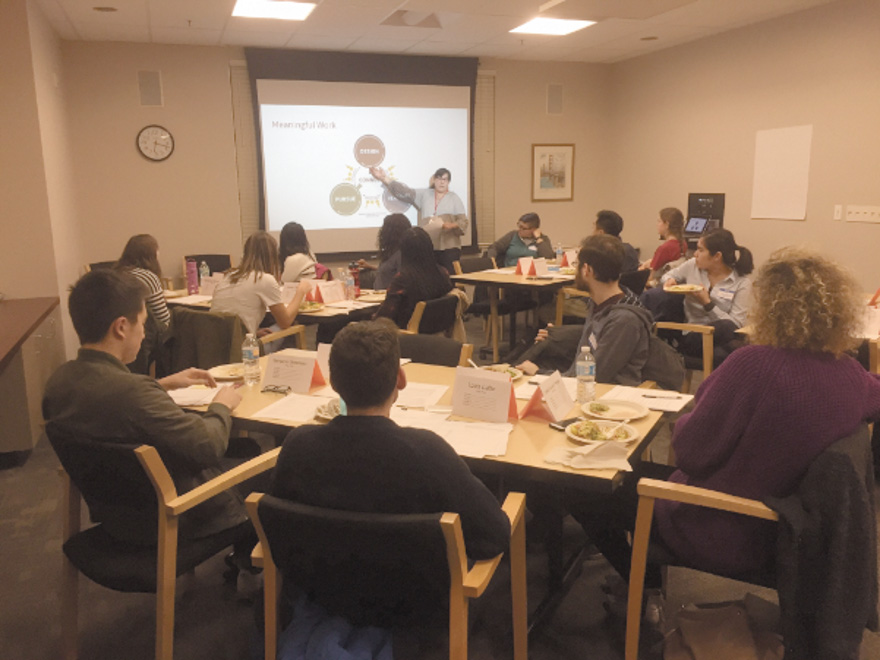Last week, BEAM, Stanford’s career education center, celebrated the launch of the Meaningful Work Certificate, a program designed to guide students toward work that they will find fulfilling.
Currently piloted to majors in the humanities and natural and social sciences, the program incorporates a number of resources and services already offered at Stanford and BEAM into a three-phase experience of designing, exploring or “venturing into” and, finally, pursuing potential career opportunities.
“It’s an easier entry point that gives [students] a place to start,” said Farouk Dey, associate vice provost and dean of career education. “Once students start and figure things out and have answers to their questions, then we believe and have confidence that they will be able to take it from there.”
Students participate in the program over winter and spring quarters. They meet in cohorts three times during that period for self-assessment and reflection activities as well as to plan individual program activities and future quarters.
In the “design” phase of the program, students work with career coaches and their cohorts to identify their interests and strengths, eventually taking part in a networking opportunity where they practice interacting with possible employers. In the “venture” phase, students choose three immersive experiences — such as shadowing, career treks, alumni mentorship and interaction with employers — to prototype how they might achieve meaningful work.
Then, in the final “pursue” phase, students complete two job-search activities to gain confidence and experience in landing a desired position or career. This can involve job interviews, job applications, resume polishing, LinkedIn profile building or participation in a job search web seminar for humanities and science.
The three-tiered design is intended to make the career-exploration and pursuit process less intimidating. Program organizers said a major reason BEAM created the program was its recognition that students can be overwhelmed by the abundance of resources and career paths at Stanford.
“Majors in the School of Humanities and Sciences sometimes lead to a direct career, but oftentimes, they can lead to multiple careers,” said Urmila Venkatesh, assistant dean of career education and associate director of the Career Catalysts Curriculum and Life Design Lab, which are other BEAM programs that help students to capitalize on their skills and develop professionally. “So the most important part is for students to start figuring out what brings meaning to them, what they like and what they are interested in, and we wanted to start this group to give them a structure for figuring out what they really want to do and how to get there.”
Margot Gilliland, assistant dean of career education and associate director of career communities, emphasized that career connections are at the heart of the program.
“It’s about connecting … to the opportunity around jobs and internships and then connecting with alumni, employers or, really, with each other too,” Gilliland said.
Students who complete the program will receive a notation in the digital “locker,” called MyLocker, that also contains their transcripts. The certificate itself will be separate from the transcript, but it will be easily accessible for use when applying to jobs.
BEAM began developing the program over the summer and decided to launch it this quarter after receiving positive feedback from students. Venkatesh said the enthusiastic responses at two launch events last week confirmed for the program’s creators the importance of not only career discovery but also community with other students.
“Students showed a strong interest in having a community of peers and knowing that there are people on campus with similar problems and questions,” Venkatesh said. “What we saw at the launch event was a room full of students excited that they were not alone — that they had peers with similar career concerns.”
The program’s creators hope to eventually expand the program to many other groups, including graduate students, underrepresented minorities and students in other academic fields.
“The concept of meaningful work is universal,” Dey said. “Everyone relates to it, no matter what your major is, what your background is. Everyone wants to connect with that, but their concerns and the issues that they deal with are different based on their life situations. So we’re going to learn a lot from the experience of piloting this with the humanities and sciences, and then we are going to make this program bigger and better.”
Contact Lucy Arnold at lucywa20 ‘at’ stanford.edu.
